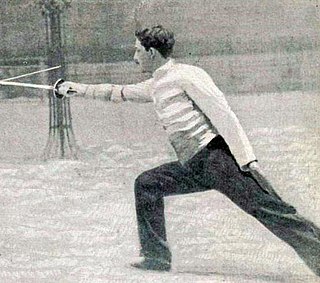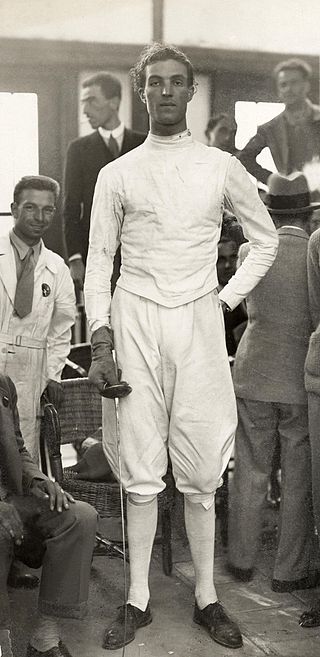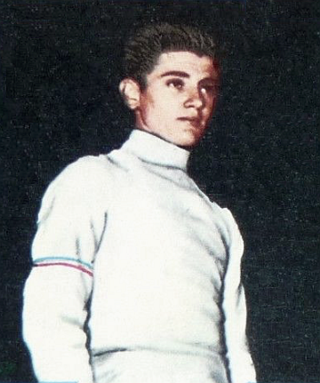
At the 1900 Summer Olympics, seven fencing events were contested. 260 fencers from 19 nations competed. The events took place at the Tuileries Garden.

The men's sabre was one of four fencing events on the Fencing at the 1908 Summer Olympics programme. The top two places were won by Hungarian fencers, who also took the gold medal in the team sabre event. Jenő Fuchs took the gold medal and Béla Zulawszky the silver. Bronze went to Bohemian Vilém Goppold von Lobsdorf. There were 76 competitors from 11 nations. Each nation could enter up to 12 fencers.

The men's foil was one of eight fencing events on the fencing at the 1964 Summer Olympics programme. It was the fourteenth appearance of the event. The competition was held from October 13 to October 14, 1964. 55 fencers from 21 nations competed. Nations had been limited to three fencers each since 1928. The event was won by Egon Franke of Poland, the nation's first victory in the men's foil. France returned to the podium after a one-Games absence, with Jean-Claude Magnan taking silver and Daniel Revenu the bronze.

The men's épée was one of eight fencing events on the fencing at the 1964 Summer Olympics programme. It was the fourteenth appearance of the event. The competition was held from October 18 to 19 1964. 65 fencers from 25 nations competed. Each nation was limited to three fencers. The event was won by Grigory Kriss of the Soviet Union, the nation's first gold medal in the event after a bronze four years earlier. The Soviets also took bronze, with Guram Kostava finishing in third place. Between the two was silver medalist Bill Hoskyns of Great Britain; it was the second consecutive Games with a British silver medalist in the event. Italy's six-Games gold medal streak in the men's individual épée ended with the nation missing the podium entirely; Gianluigi Saccaro finished fourth after losing the bronze-medal barrage to Kostava.

The épée event for amateurs was one of three épée events at the 1900 Summer Olympics. 102 fencers from 11 nations competed, with 91 of them from France. The event was won by Ramón Fonst of Cuba, the first of his two golds in individual épée. Silver and bronze both went to host nation fencers, Louis Perrée and Léon Sée. These badly organized games — derisively called “The Farcical Games” — were so poorly publicized that years later, even the competitors were clueless that they had competed in the Olympics in 1900. No official records for the games exist. These accomplishments are not even mentioned in the 1911 Encyclopædia Britannica. This was the first appearance of the event, as only foil and sabre events had been held at the first Games in 1896; the Men's épée event has been held at every Summer Olympics since 1900.

The professional event in épée at the 1900 Summer Olympics had 54 fencers from 5 nations compete. The event took place from 11 to 14 June at the Tuileries Garden. The event was won by Albert Ayat of France, leading a French sweep with Gilbert Bougnol taking silver and Henri Laurent bronze.

The amateur foil competition had 54 fencers from 10 nations compete. There was no limit on the number of fencers per nation; 39 of the 54 competitors were French. For the first round, quarterfinals, and repechage, skill and art with the foil was more important to advancing than winning the bout. The event was swept by French fencers: Émile Coste, Henri Masson, and Marcel Boulenger took the top three places. It was the second consecutive Games that France had taken the top two ranks

23 fencers from 7 nations competed in the amateur sabre competition. The event was won by Georges de la Falaise of France, with his countryman Léon Thiébaut placing second. Austrian Siegfried Flesch was third.

The professional sabre competition at the 1900 Summer Olympics involved 27 fencers from 7 nations. It was held from 23 to 27 June at the Tuileries Garden. The event was won by Antonio Conte of Italy, with that nation also receiving second place with Italo Santelli. Austria's Milan Neralić finished third.

The men's foil was one of seven fencing events on the Fencing at the 1928 Summer Olympics programme. It was the seventh appearance of the event. The competition was held from 31 July 1928 to 1 August 1928. 54 fencers from 22 nations competed. For the third straight Games, the limit of fencers per nation was reduced. The event was won by Lucien Gaudin of France, the nation's second consecutive and fourth overall victory in the men's foil. Erwin Casmir earned silver to give Germany its first medal in the event. Giulio Gaudini of Italy took bronze.

The men's épée was one of seven fencing events on the fencing at the 1936 Summer Olympics programme. It was the ninth appearance of the event. The competition was held from 9 August 1936 to 11 August 1936. 68 fencers from 26 nations competed. Nations were limited to three fencers. The event was won by Franco Riccardi of Italy, the nation's second consecutive victory in the men's épée. Riccardi's teammates Saverio Ragno and Giancarlo Cornaggia-Medici took silver and bronze, respectively, to give Italy a medal sweep—Italy's first and the fourth overall in the event. Cornaggia-Medici, who had won gold in 1932, became the fourth man to win multiple medals in the individual épée. For the first time, France competed in the event but did not win any medals.

The men's foil was one of seven fencing events on the fencing at the 1936 Summer Olympics programme. It was the ninth appearance of the event. The competition was held from 5 August 1936 to 6 August 1936. 62 fencers from 22 nations competed. Nations were limited to three fencers. The event was won by Giulio Gaudini of Italy, the nation's second consecutive and fourth overall victory in the men's foil. Gaudini, who had won bronze medals in 1928 and 1932, was the first man to win three medals in the event. His countryman Giorgio Bocchino took bronze. Edward Gardère put France back on the podium after a one-Games absence.

The men's foil was one of seven fencing events on the fencing at the 1948 Summer Olympics programme. It was the tenth appearance of the event. The competition was held from 3 August 1948 to 4 August 1948. 63 fencers from 25 nations competed. The event was won by Jehan Buhan of France, the nation's first victory in the men's foil since 1928 and fifth overall. His countryman Christian d'Oriola took silver, while Lajos Maszlay earned Hungary's first medal in the men's individual foil with his bronze.

The men's foil was one of seven fencing events on the fencing at the 1952 Summer Olympics programme. It was the eleventh appearance of the event. The competition was held from 23 July 1952 to 24 July 1952. 61 fencers from 25 nations competed. All three medallists were left-handed. Nations were limited to three fencers each since 1928. The event was won by Christian d'Oriola of France, the nation's second consecutive victory in the men's foil and sixth overall. D'Oriola was the fifth man to win multiple medals in the event. The silver and bronze medals were won by Edoardo Mangiarotti and Manlio Di Rosa of Italy.
The women's foil was one of eight fencing events on the fencing at the 1984 Summer Olympics programme. It was the twelfth appearance of the event. The competition was held from 2 to 3 August 1984. 42 fencers from 18 nations competed.
The women's foil was one of eight fencing events on the fencing at the 1988 Summer Olympics programme. It was the thirteenth appearance of the event. The competition was held from 21 to 22 September 1988. 45 fencers from 19 nations competed.

The men's épée was one of eight fencing events on the fencing at the 1992 Summer Olympics programme. It was the twenty-first appearance of the event. The competition was held on 1 August 1992. 70 fencers from 30 nations competed. Each nation was limited to three fencers. The event was won by Éric Srecki of France, the nation's fifth victory in the event. France also took bronze, with Jean-Michel Henry winning the bronze medal match. France's podium streak in the event extended to four Games. Pavel Kolobkov of the Unified Team took silver.

The men's foil was one of eight fencing events on the fencing at the 1992 Summer Olympics programme. It was the twenty-first appearance of the event. The competition was held on 31 July 1992. 59 fencers from 25 nations competed. Nations had been limited to three fencers each since 1928. The event was won by Philippe Omnès of France, the nation's first victory in the men's foil since 1956 and eighth overall. Serhiy Holubytskiy of the Unified Team took silver. Elvis Gregory earned Cuba's first medal in the event in 88 years with his bronze.
The men's sabre was one of eight fencing events on the fencing at the 1992 Summer Olympics programme. It was the twenty-second appearance of the event. The competition was held on 2 August 1992. 44 fencers from 19 nations competed. Nations had been limited to three fencers each since 1928. The event was won by Bence Szabó of Hungary, the nation's first victory in the men's sabre since 1964 and 12th overall. Marco Marin took silver while Jean-François Lamour finished with the bronze. Lamour, who had won gold in 1984 and 1988, was unable to win a third title but still became only the second man with three medals in the event. Marin had also finished second in 1984; he was the 12th man with multiple medals in the sabre.
The women's foil was one of eight fencing events on the fencing at the 1992 Summer Olympics programme. It was the fourteenth appearance of the event. The competition was held on 30 July 1992. 46 fencers from 19 nations competed.

















